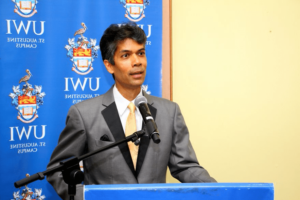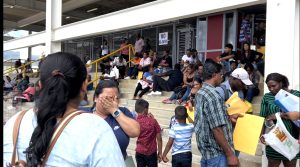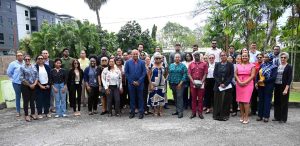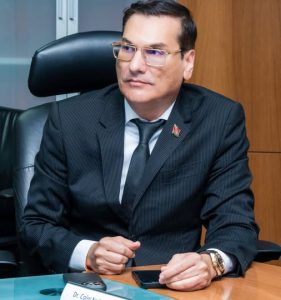‘It’s easy to say or write that developed countries must stop meddling in the affairs of other countries. The sad reality is that the developing countries often need that intervention’

THE money and effort wasted in the Gulf War (1991) (also known as the Kuwait War, First Iraq War, Persian Gulf War) and to destroy Iraq in 2003 and Afghanistan in 2001 could have been wisely used to assist in providing clean drinking water, alleviate poverty or curb drug trafficking.
It is ironic that after invading these countries, the developed nations in the coalitions embarked on a programme of transitional governments and to rebuild the devastated Iraq and Afghanistan.
Whilst one hand is destroying the other hand is reconstructing. A well-rehearsed role which is deserving of an Academy Award from Hollywood. It seems like a deliberate ploy to forever keep certain countries in a dependency state and maintain the global status quo.

Additionally, developed countries will be very eager to initiate and prolong conflicts to justify their military spending and paranoid security measures.
‘Some persons would disagree that developed nations should reduce the focus on foreign policies and deal with their domestic crises such as the massacres in schools by teenagers and the psychopaths who are serial killers’
It’s easy to say or write that developed countries must stop meddling in the affairs of other countries. The sad reality is that the developing countries often need that intervention. For instance, think of a future if developed countries, in 2022, chose to ignore providing assistance and military training to Ukraine in the war with Russia.
Some countries use covert agencies such as the Central Intelligence Agency (CIA) to harass innocent individuals, destabilise countries and plan assassinations of foreign leaders.

Some persons would disagree that developed nations should reduce the focus on foreign policies and deal with their domestic crises such as the massacres in schools by teenagers and the psychopaths who are serial killers. All developed countries should examine themselves in the mirror and try to curb the increase in smoking and alcoholism among its teenagers, the rise in divorces and increase in religious bigotry and racism.
Nobody anointed developed countries as global policemen to patrol the world maintaining peace and security.
Substantial international intervention is needed to protect weaker countries because ignoring or isolating any problem further reduces the chances for speedy cordial international relations.
Now more than ever, there is a need for mediators to act wisely and speedily in such conflict situations. There should neither be insubordination nor alienation. The reality of the world’s present economic system is that it thrives on inequalities and competition.
There is a need to seriously undertake the challenge to reduce inequalities instead of passively accepting that the social problems of a capitalistic society are irreversible.
The intellectuals and activists cannot keep accepting and believing that poverty and unemployment will always exist.
Those in authority are afraid to disturb the status quo and dismantle certain aspects of the world’s economic system for fear of catastrophic repercussions. This is a precaution that contributes to untold suffering and death.
It is probably one of the world’s glaring paradoxes that developing countries receive monetary aid from developed countries, which initially became industrialised and wealthy as a result of earlier (and still continuing) exploitation of mental and physical labour.

This financial assistance would eventually be returned in the repayment of debts to a developed country or international financial institution. The monies from the repaid debt would be used to both improve the developed country and again used as aid to a developing nation. In effect, capital is being ‘recycled’ and little remains in the developing nations.
There is a need to vigorously promote a consciousness among the diaspora of developing nations residing in developed countries. Some the taxes paid by this immigrants return as international aid to the developing countries of these migrants.
The diaspora from the Global South should realise their pivotal role and must pledge a greater commitment, both intellectual and financial, to ensure a stable and permanent path of progress in their former homelands. The task of
rebuilding is an uphill journey but the rewards far outweigh the sacrifices.
Second and third generations of the Global South diaspora must realise that their past is rooted in regions that need their help. In a strict geographical or economic sense the bipolar world can be identified but with increasing migration, the boundaries between the developed and developing are becoming ambiguous and difficult to define.
Dr Jerome Teelucksingh is an activist. He initiated the inaugural observances of International Day for the Elimination of Violence Against Men and Boys (January 31) and World Day of the Boy Child (May 16). He has made academic presentations at tertiary institutions including Harvard University and Oxford University.
See other articles by Dr Jerome Teelucksingh on AZP News:
End the Dependency for Developing Countries
T&T Carnival and the Emperor’s New Clothes
The Influence of Labour on Caribbean Integration
The illusion of political Unity
Presbyterians in Trinidad: Humble Missionaries, Local Workers
Religious Plurality: Curse or Blessing
Caribbean Youth Need Optimism, Patriotism
Rethinking Identities in Caribbean, Latin America
November 19: All Inclusive International Men’s Day
Should International Agencies be Blamed for Unemployment
A Need to Observe Word Unemployment Day
An Ideology for the Trade Union Movement
The Man who Couldn’t be Prime Minister
Social Outburst vs Social Revolution
Challenges of the Men’s Movement
If George Floyd was Denied Parole
The Meaning of Indian Arrival Day in T&T
International Men’s Day – A Way of Life
Wounds that cause school violence
May Day: A Time for Solidarity, Strength
Who Coined the Term ‘Black Power’
The illusion of political Unity
Presbyterians in Trinidad: Humble Missionaries, Local Workers
Religious Plurality: Curse or Blessing
Caribbean Youth Need Optimism, Patriotism
Rethinking Identities in Caribbean, Latin America
November 19: All Inclusive International Men’s Day
Should International Agencies be Blamed for Unemployment
A Need to Observe Word Unemployment Day
An Ideology for the Trade Union Movement
The Man who Couldn’t be Prime Minister
Social Outburst vs Social Revolution
Challenges of the Men’s Movement
If George Floyd was Denied Parole
The Meaning of Indian Arrival Day in T&T
International Men’s Day – A Way of Life
Wounds that cause school violence
May Day: A Time for Solidarity, Strength
Who Coined the Term ‘Black Power’
![]()












